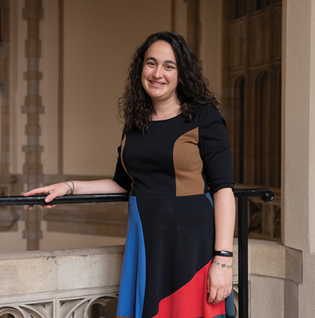
Robert Desanto
Maytal Saltiel is now Yale’s eighth university chaplain-—and first non-Christian chaplain.
View full image
In 1951, fearing his alma mater had acceded its Christian character to proselytizing Marxists and an irreligious chaplaincy, one concerned alumnus penned a fiery cri de cœur: William F. Buckley Jr. ’50’s God and Man at Yale cautioned in 1951 that secularism could all but kill the university. Seven decades later, Yale is still around, and for a couple of reasons, the person charged with leading its spiritual life is someone Buckley probably never could have imagined.
When Sharon Kugler—the first woman, layperson, and Catholic to serve as university chaplain—retired in June after 16 years in the role, associate chaplain Maytal Saltiel stepped up to the post as Yale searched for a permanent successor. Then, in January, Yale dropped the “interim” from Saltiel’s title, making her the eighth University Chaplain and the first non-Christian in the role. (Associate chaplain Ian Oliver, a minister in the United Church of Christ, continues to serve as pastor of the University Church in Yale, which holds services in Battell Chapel.)
Saltiel, who identifies as Jewish, began working in the chaplain’s office in 2013.
She is keen to meet the evolving spiritual needs of a religiously diverse community, which she says is still convalescing from COVID-19, not to mention world events felt acutely on college campuses. She concedes that today’s chaplaincy looks different from the office Elmore McKee ’19, ’21BDiv, first led in 1927, but she rejects the idea that Yale is home only to heathens. Rather, perhaps to Buckley’s delight, Saltiel says Yalies are as spiritually engaged as ever.
“I think it’s so ironic that people say the ‘Godless nature of Yale.’ Yale has never given up the God-ness within its culture,” says Saltiel. “In the way that we think about religion or the ways that we think about spirituality, we are a microcosm of American and global society. So religion hasn’t disappeared, though the secular thesis argued that it would. It looks different, but it is still here, it is still present, it is still thriving.”
Saltiel’s career as a professional facilitator didn’t begin at a seminary. As an undergrad at Johns Hopkins in the 2000s, Saltiel says her “aha moment” came through kosher Chinese Shabbat dinners and interfaith forums led by none other than Sharon Kugler, who was then University Chaplain at Hopkins. She says her interests in diplomacy, conflict transformation, and peacebuilding were transferred to a profession that, she admits with a smile, she didn’t even know existed when she enrolled as an international relations major. She went on to Harvard Divinity School, where she earned her master of divinity in 2012.
Saltiel responds to the pressures of grind culture, 24/7 social media, and generational mistrust in institutions—not with dogma, but with a cheeky sense of hospitality. On Cross Campus, in the thick of COVID’s protracted strain on Yale, Saltiel wheeled out 300 inflatable pink flamingos tagged with collars that said, “embrace whimsy.” She says the chaplaincy also relies on flexible responses to acute traumas.
In a time of campus tensions over the Hamas-Israel War, Saltiel says members of the Yale community must be “attuned to one another in a different way when our nervous systems are in that spot. The work of community building is not ‘Kumbaya,’ and it’s not like I have magic fairy dust that’s gonna make everything better, but it’s ‘How do we listen to one another in the pain?’”
In a way, Saltiel’s vision for Yale’s modern chaplaincy looks to the office’s origins as a hub for hospitality and spiritual inquiry. “I think at its core, chaplaincy at Yale has always been there to embrace students exactly as they are,” Saltiel says. “So ‘exactly as they are’ I think looks different now than it did then, but I hope that alumni who have interacted with the chaplaincy remember that warm embrace.”
 loading
loading